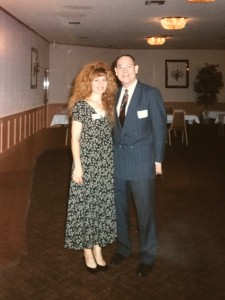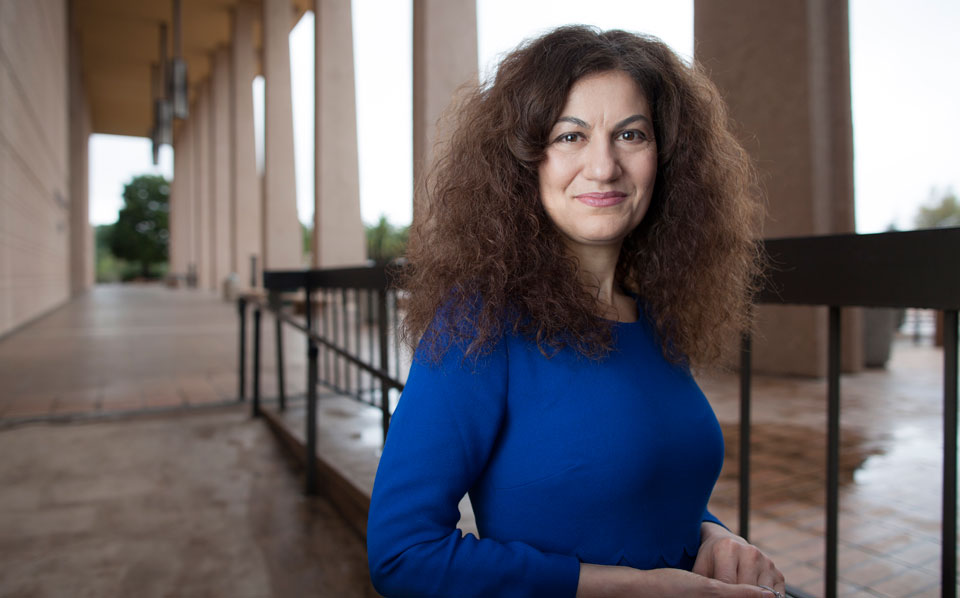Former Armenian Refugee and CSUN Alumna Pays it Forward to Refugee Families
When an Armenian family fled their home country of Iran in August 1984 to escape the Iran-Iraq war — as well as the political and religious oppression of the time — they did not know what the future held for their three young daughters. Hopeful to start a new life in the West, the family arrived in a refugee camp in Karlsruhe, a city in southwest Germany, in August of that year. But when the taxi dropped them off in front of the camp, their hopes vanished in the face of the prison-like military gates that fenced in hundreds of refugees living in the camp.
The family’s second oldest daughter, Yvette Hovsepian Bearce ’93 (Business) still remembers her life in that refugee camp in Germany — the hopelessness, anxiety and fear of the future. Little did she know she soon would be living the American dream — graduating from California State University, Northridge with a bachelor’s degree in business, earning a master’s degree in theology from Fuller Theological Seminary in Pasadena and then a Ph.D. in Islamic studies from UCLA.
“When I looked at that camp, my heart immediately said, ‘Yvette, there is no opportunity or chance for you to be a little girl anymore,’” a then 18-year-old Hovsepian Bearce recalled. “You have to be a lion because you just walked into a lion’s den. Your job is now to protect this family — to protect mom and your two little sisters.”
Hovsepian Bearce, still traumatized by the events of fleeing her home country, leaving behind relatives, friends and her father, transformed from a shy and quiet girl into a strong-minded leader. Equipped with only one Farsi-German dictionary, Hovsepian Bearce and her younger sister immediately studied the German language and culture, becoming proficient in just four months.
“I knew if I wanted to find my place in this society and not become a victim of a refugee camp, I had to learn the language and the culture and accept my new life — and the new reality for me,” she said.
After eight months, Hovsepian Bearce’s father joined the family in Germany, 10 months later, in January 1986, the family moved to California after their asylum request was granted. It was a painful experience for Hovsepian Bearce, who had just come to accept Germany as her new home, she said.
“Germany is not just some country for me,” she said. “Every time I visit and get off the plane, it makes me tear up and I tell myself ‘I am home.'”
Finding her American Self — at CSUN
Hovsepian Bearce and her family arrived in Glendale on a Monday in January 1986, and a week later, she had started English as a Second Language (ESL) classes at Glendale High School. Still mourning the departure from Germany, Hovsepian Bearce started her journey through American college life and found herself in a major identity crisis.
“There was always the question, ‘Who am I?’” she said. “Am I an Armenian, a Persian, a German or an American? What is my language? Armenian is my mother tongue, but is it really my language? I know I made Germany my home, but is it really my home? Or is America my home? I was born in Iran, so would that actually be my home? Where is home? You struggle with all those questions, and it takes a while to sort them out.”
It took Hovsepian Bearce nearly 10 years to fully identify herself as an American, she said. After graduating from Glendale Community College with an associate’s degree in arts, she transferred to CSUN in September 1989. Attending CSUN was one of the fundamental steps to finding herself in her new country, she said.
“The fact that an American university accepted me — a foreign girl who had only been here for three years — was a sense of approval and appreciation,” she said. “I started feeling like an American. I felt a sense of acceptance and a sense of growth and maturity.”
Hovsepian Bearce said she has fond memories of her time at CSUN and particularly remembered James Bennett, a business administration professor at the time, who initially failed Hovsepian Bearce for a major assignment in a business writing class. Discouraged by the failing grade, Hovsepian Bearce made an appointment with the stringent professor.

Yvette Hovsepian Bearce and her mentor, former CSUN professor James Bennett at Hovsepian Bearce’s scholarship award ceremony in 1993. Photo Courtesy of Yvette Hovsepian Bearce.
“I reminded him that I was only in the U.S. for three years and had to learn English while going to college,” she said. “I asked, ‘Why did I get an F?’ and he responded, ‘Because I care about you.’”
She recalled Bennett explaining that he wanted her to write like a businesswoman, and the only way to reach this goal was to point out mistakes from which she could learn. Bennett challenged her the most during her time at CSUN, Hovsepian Bearce said, but he also helped her to grow professionally and personally.
“I will always remember him. He was a good mentor,” she said. “I struggled in his class — English was my fifth language at that time — but I went from an F to a B minus. The next class I took with him, I got an A and a $200 scholarship for writing a business plan.”
Studying Iran and Publishing Her First Book
After graduating from CSUN, Hovsepian Bearce scored a job at a local firm, but as an expert linguist, speaking Armenian, Farsi, Dari, Tajiki, German and Arabic — a unique and notable combination — she soon found work serving as an interpreter for state, federal and immigration courts. After the 9/11 attacks, she joined the FBI’s counterintelligence and counterterrorism unit as language consultant and analyst.
Interested in diplomacy and with a passion for finding peaceful solutions to the conflicts in the Middle East, Hovsepian Bearce said she decided to do a comparative study of the three dominant religions in the Middle East – Islam, Judaism and Christianity – and obtained a master’s degree in theology from Fuller Theological Seminary in Pasadena (in 2007). With a focus on U.S.-Iran relations, she pursued her Ph.D. in Islamic studies from 2008-12 at UCLA, where she wrote her dissertation analyzing the political worldview of Iran’s supreme leader, Ayatollah Khamenei.
“There seemed to be a lack of understanding among U.S. policymakers about the hierarchy in the Iranian leadership,” Hovsepian Bearce said. “Americans seemed to fail to realize that it was not the Iranian president but the Supreme Leader who was the key decision maker on all domestic and foreign policies. In diplomatic communications, there was hardly any focus on the Supreme Leader, and I felt that I could contribute to this understanding. So, I decided to conduct a thorough analysis of the theocratic ideology of Iran’s Supreme Leader and provide solutions for resolving Iran’s nuclear program.”
With Washington, D.C., in mind as her audience, Hovsepian Bearce wrote her 457-page dissertation, including 1,200 references, in nine months. She primarily focused on Farsi sources published in Iran. On the day she defended her dissertation, committee member Steven Spiegel, head of the Center for Middle East Development at UCLA, proposed his plan to turn the dissertation into a book.
“I hoped my writing could provide some understanding and solutions on how to deal with Iran diplomatically, in order to solve the nuclear issue, so I provided recommendations in my conclusion,” she said. “I didn’t realize how impressed my dissertation committee would be by my work.”
In short order, the book was published. Since its release in August 2015, The Political Ideology of Ayatollah Khamenei has gained national and international recognition. Former President Barack Obama and former presidential candidate Hillary Clinton received copies of the book, and both sent Hovsepian Bearce personal thank-you notes, she said. Hovsepian Bearce also sent copies to a dozen U.S. policymakers in California and Washington D.C., as well as to former U.S. Secretary of State John Kerry, Israeli Prime Minister Benjamin Netanyahu, Saudi Arabian Foreign Minister Adel al-Jubeir and Iranian United Nations Ambassador Gholamali Khoshroo. Hovsepian Bearce also hand-delivered a copy to German Chancellor Angela Merkel.
Returning to Refugee Camps — to Give Back
Hovsepian Bearce has been involved with the Syrian refugee crisis since 2015, volunteering in refugee camps throughout Germany and developing integration programs with nonprofit organizations and camp directors. She also travels across the U.S., giving presentations on the issue to raise awareness.
“I understand refugees,” she said. “When I go and help refugees, I know exactly what goes on in their hearts and in their minds. I know the feeling, the overwhelmingness, the anxiety, the fears, the concerns — I feel them all. They don’t have to tell me anything. I see it in their eyes and in their faces.”
According to the United Nations Refugee Agency, 21.3 million refugees are currently displaced worldwide — about half of them are under the age of 18. Hovsepian Bearce said she wants to bring awareness to the dire situation and help refugee families, individuals and children seeking a future.
“This country embraced me and gave me life,” she said. “It gave me a future and allowed me to live the American dream. Now, I feel the obligation to give back.”


 experience
experience